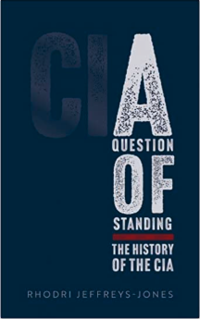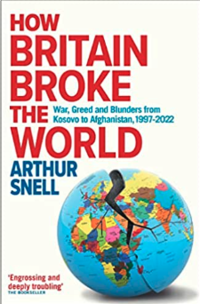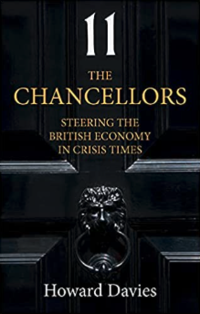OFF THE SHELF: AUGUST 2022

OFF THE SHELF: AUGUST 2022
This month sees British identity and the ‘special relationship’ with the US under the spotlight, and a new history of the CIA
Published: 11 August 2022
Author: Richard Lofthouse
Share this article
Off the Shelf’s raison d’etre is that we review what is published, but it leads to some lop-sided outcomes, such as a neat cluster of history when you might have expected beach novellas in August. That is how this month’s cookie crumbled, but it will find its balance next month!

So we begin with Anatomy of a Nation, A History of British Identity in 50 Documents by Dominic Selwood (Constable, 2021; PB September 2022). Whether in paperback (from September) or in Kindle form this would actually be a superb holiday pick because it’s sparky, original, dip-in-able and full of fresh insights.
Dominic (New College, 1993) is a brilliant barrister, well-known historian, author and journalist, to say nothing of being a Fellow of the Royal Historical Society. Here he has taken a fresh look at British identity through 50 documents, self-consciously at a moment of ‘an acute trauma of identity’. You’re thinking Magna Carta [ETC]. But no, wait: those fifty documents are cleverly chosen, and balance the ‘drums and trumpets’ stuff with women and minorities and counter-culture, the author making plain from the start that he takes no position in the so-called culture wars but hey, Winston Churchill is now reviled as well as revered and it’s the historian’s job to show why.
The Romans brought literacy in AD 49 and that is officially the start of history (caveated of course). Everything since then is only the last three minutes if the entirety of British history is viewed as a 24-hour period, Selwood explains. But if we want to bat about national identities it’s helpful to have documents. Selwood starts with axe heads from Stonehenge to lift the curtain on the pre-history, but it’s not quite the case that the book really covers 950,000 years of the British past; more that it helpfully reminds us that there were no ‘indigenous’ populations to Britain, owing to the fact that it wasn’t even an island if you go back far enough, but a peninsula of the European mainland occupied by different hunting nomads. Not a very Brexity start then.
We then get a superb array of documents from the age of Arthur through to, for example, a scrawled piece of plague graffiti from 1350, ‘plague 1350 pitiable savage violent,’ updated eleven years later with a survival narrative, ‘the dregs of the people survive to witness…in this year 1361.’ Then off into Cromwell, Isaac Newton; hunting pirates; Romanticism and empire. Britain has spent its whole history fighting and killing, one emergent theme.
Then we get to Hitler’s kill-list, had the Nazis successfully invaded England. The document was called the Sonderfahndungsliste G.B. and contained 3,000 names including a surprising number of artists and publishers – such as the Jewish sculptor Sir Jacob Epstein and H.G. Wells; Virginia Woolf and Bertrand Russell, the latter misspelt with only one ‘l’. These individuals were to be rounded up by liquidation squads and executed. The Nazis would set up shop at Blenheim Palace, and Nelson’s Column would be dismantled and re-erected in Berlin. All the museums would be looted. Dominic shows how the document is a comprehensive view of ‘Britishness’ through a would-be conqueror. Clever that – not how we saw ourselves but how we were perceived.
Another inspired choice that echoes Arthur Snell’s book (below) is the decision to include Tony Blair’s Foreword to the Iraq ‘Dodgy Dossier’ from 2002. As the dust settles on the process that led to the second Iraq war, that decision is looking worse and worse, and Dominic explains why. It’s a muddled mixture of humanitarian intent, kow-towing to America, and wilful misuse of intelligence sources that of course couldn’t be shared and thus scrutinised. There were no weapons of mass destruction.
Otherwise, the main point is that the author, combines barrister precision with historian instincts to deliver each document in a mini-essay, so the context is there too and not just a hit and run. That accounts for the long length of the book, and we’re bound to say that it’s worthwhile endeavour, each and every word.
Guaranteed, we’d offer, that your view of British identity and maybe your own will be different by the end.
A Question of Standing: The History of the CIA by Rhodri Jeffreys-Jones (Oxford University Press, August 25, 2022)

Timely this book, given the FBI’s recent raid on a former US President’s home. The author is very well known as perhaps the greatest single authority on US intelligence history, having written extensively about both the FBI and the CIA. He is also professor of American history emeritus and an honorary fellow in History at the University of Edinburgh, Scotland. Oxford University Press have a winner on their hands here because the book offers a single volume treatment of a subject that all too readily falls to a partisan inflection. It’s a masterful but concise sweep of analysis; all done in just over 200 pages. The CIA were very close to unravelling 9/11 but none of the agents spoke Pashto. They failed to get inside al Qaeda. In the aftermath, the standing of the CIA sank to a low point, having risen to great heights in the 1950s after its founding in 1947. Then we get to Trump, and his Presidency is treated as history. It was another low point for the CIA, but also a high point doing what they were meant to do, such as pointing out that Russian had fiddled in the 2016 Presidential election. ‘Offended by the suggestion that he had not won the election fairly, President Trump therefore turned on the agency, portraying it as having been at the hub of an elitist conspiracy to frustrate the will of the people.’ These final chapters are a graceful illustration of why professional historians matter so very much.

How Britain Broke the World, War, Greed and Blunders from Kosovo to Afghanistan, 1997-2022, by Arthur Snell (Canbury Press, 2022)
We will talk to the author (Magdalen, 1994) later this summer, for a longer feature, but suffice it to say here that this remarkable book is guaranteed to break some waves. The narrative, which is not a memoir but is informed by Arthur’s professional experience as a diplomat and an Arabic speaker, ruthlessly exposes the hubris of successive Prime Ministers, who, irrespective of political party have undermined the rules-based international order that we claim as a nation to uphold. The book fully includes Russia’s invasion of Ukraine in 2022, as such very hot off the press. The extraordinary thing is that there is a terrifying arc, or echo if you prefer, that connects Ukraine in 2022 with the then Labour government’s decision to go to war in Iraq, falsely citing Weapons of Mass Destruction. Snell speaks of a Britain that is ‘at the very least, desperate to please [the US], delusional, self-important, and slapdash.’ And that refers to the Blair years, long before BREXIT. If you want to know what Iraq has been like since the US/UK invasion, and what it is like now, you can read that here too. It makes for exceptionally uncomfortable reading.

The Chancellors, Steering the Economy in Crisis Times by Howard Davies (Polity, 2022)
The author (Merton, 1969) has produced an intensely personal, wise commentary on the state of the Treasury in British public life and politics, taking the narrative from 1997, when the recently elected Blair government handed control of interest rates to the Bank of England, up to the end of COVID but just missing the rapid rise of inflation and hence interest rates that now defines the second half of 2022. In some ways the book notes that affairs have so radically undermined other departments of state, (consider the Foreign Office after BREXIT or the business department, which has never had much power anyway) that the Treasury still sits pretty. But in most other ways it is portrayed as being radically out of joint with the times. In particular, he notes, the ‘Treasury view…’ which was once conjured up by Winston Churchill, has been reinvented constantly since but remains at heart one of free trade and pro-markets. That, says Davies, puts it at complete odds with BREXIT, which not only took Britain out of the Single Market but forced it into a string of questionable bilateral trade agreements. Then, we are in an era of IMF thinking where huge public debt because of COVID is considered OK; but only while interest rates remain low. That’s already changing by the day, and the book doesn’t need to be prescient to state the bloomin’ obvious: ‘At some point interest rates will rise and the debt burden will need to be reduced.’ Instead we appear to be on track for lower taxes, which will impact on anything else the state funds, such as healthcare. On climate change, the author cites Sir Nick Stern to the effect that the Treasury are more or less clueless and would need to really embrace massive and far-reaching changes to tackle massive and far-reaching climate changes. Unlikely to happen, is the view! Anyway, it’s a super book, easily absorbed, written by a true insider, and with that level and wise approach that one might expect from a Mertonian.
Off the Shelf typically concerns books where there is an Oxford connection, whether the place, the University or of course the author.
Alumni can claim 15% discount in any Blackwell's store with a My Oxford Card.
Alumni can claim 20% discount at Oxford University Press.
Details about the Oxford Alumni Book Club are at: www.alumni.ox.ac.uk/book-club
PICTURE CREDITS: Shutterstock, Polity, Canbury, OUP, Constable.















